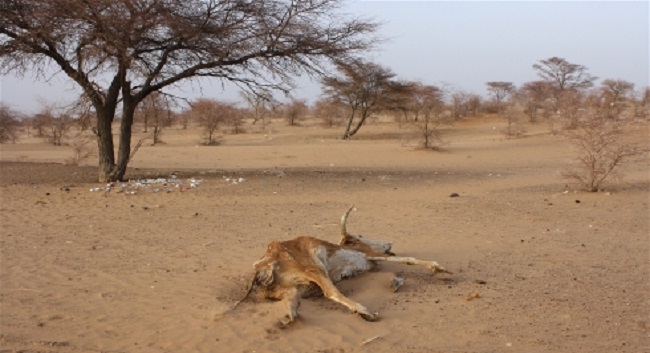More than a million face starvation in Mauritania

Carcasses dot the sandy landscape in southern Mauritania’s Hodh El Chargui region, where a lack of rain has affected both wild vegetation growth and crops. Photo: Jaspreet Kindra/IRIN
As the food security situation in Mauritania continues to deteriorate, aid workers say the next few months could be among the most difficult in years, particularly for those living in the southern and eastern parts of the country.
More than 1.3 million people nationwide are currently food insecure, according to the latest Integrated Food Security Phase Classification (IPC) assessment, which is conducted by stakeholders such as the World Food Programme (WFP), Food and Agriculture Organization (FAO), Oxfam and Save the Children.
Among them, nearly half a million people are expected to fall into severe food insecurity by June and be “unable to meet their food needs without external assistance.” Around 21,000 will suffer extreme food insecurity, or a near complete depletion of their livelihoods.
“Mauritania is a country which is affected by climate change, as well as recurrent climate-related shocks, like the drought,” said Janne Suvanto, WFP’s country director in Mauritania. “In recent years there have been successive shocks that have seriously affected the food and nutrition security of the country, and this has particularly undermined the resilience capacity of the most vulnerable populations.”
Many families still have not recovered from the 2012 drought, which left more than 800,000 people in need of humanitarian assistance.
Suvanto told IRIN that recent assessments show that the food security situation has gradually worsened in Mauritania since mid-2013 and that it is now at the same levels as during the 2012 drought.
Not enough water
Mauritania, which is about 75 percent Saharan desert and 25 percent Sahel, normally sees an average annual rainfall of less than 100 millimetres per year, according to the FAO. In recent years, locals say the rains have become even less frequent and more erratic.
Due to poor soil and agricultural conditions, many people rely on pastoralism and animal husbandry for their livelihoods.
“These last few years, have been more and more difficult,” said Hussein Ould Imijen, who has already lost 10 animals this year due to hunger and thirst. It is a devastating loss, as like most people in the community, Imijen’s ability to feed his family depends on the sale of his livestock.
In Taboit town, local resident Zeinabou Mint Mamadou Ould Neji told IRIN: “Low rainfall in recent years has not helped restore groundwater.”
She said the water levels in the wells are barely enough to cover drinking and cooking needs, never mind watering crops or gardens.
Even in towns, such as Azgueiloum in Gorgol, in southern Mauritania, which is located along the Senegal River, water is scarce.
“We have some beans and corn this year, but early drought this year has cost us dearly,” said Aminetou Mint Abeid, who is part of a women’s gardening association in Nabaam. “The assistance of international NGOs has allowed us to be a little more independent and meet our needs, but in hard times it isn’t [enough].”
Souleymane Sarr, who works for Oxfam, which has been working to improve access to water in Gorgol, agreed.
“Water is central to all these areas,” he told IRIN. “You can’t help them achieve anything without the assurance of the sustainable access to water.”
Not enough food
Dry-cereal harvests last year, such as millet, sorghum and rice, were 38 percent lower than the average of the last five years due to poor rainfall, which, according to WFP’s Suvanto, is “quite a significant figure” and will make this year’s lean season even more difficult than usual.
Many families have begun to cut down on the number of meals they eat each day as well as the quality of the food. Many people have begun selling off assets to afford staple foods.
Nearly 140,000 children under the age of five and pregnant or lactating mothers are now affected by acute malnutrition.
The health of school-aged children could be affected by the suspension of WFP’s school feeding programme in March, due to lack of funding, which helped nourish some 86,000 primary school-aged children from the country’s most vulnerable families.
Some people blame the government for not doing more.
“None of the families you see in this village received even one feed bag they were supposed to receive from the government,” said Isselmou Ould Mohamed. “Without Oxfam, ACF, or some local NGOs, there would be many more dead animals.”
“These are criminal acts,” said another angry resident in the town of Monguel, who wished to remain anonymous. “Here, our children are hungry and our cattle die. And still [the government] does not propose a solution.”
The Ministry of Rural Development, which is in charge of agriculture and livestock programmes, declined to comment.
In addition to rural areas, where the majority of food insecure people are normally concentrated, aid workers say particular attention needs to be paid to urban areas, where hunger issues are spreading.
Recent WFP assessments show that the food security situation in the outskirts of the capital, Nouakchott, for example, have been deteriorating since 2011, due in large part to the migration of the rural population to cities in search of food or work.
WFP’s Suvanto said that the organization has been working with the government and other partners on the ground to build up the safety nets of the country’s most vulnerable families by distributing food and cash.
Funding shortfalls, however, continue to limit operations.
The current WFP project is just 32 percent funded, with at least $28.1 million needed to continue operations through the end of December. The current budget allows WFP to cover just 45 percent of needs in those areas where the work is concentrated.
mk/jl/am

